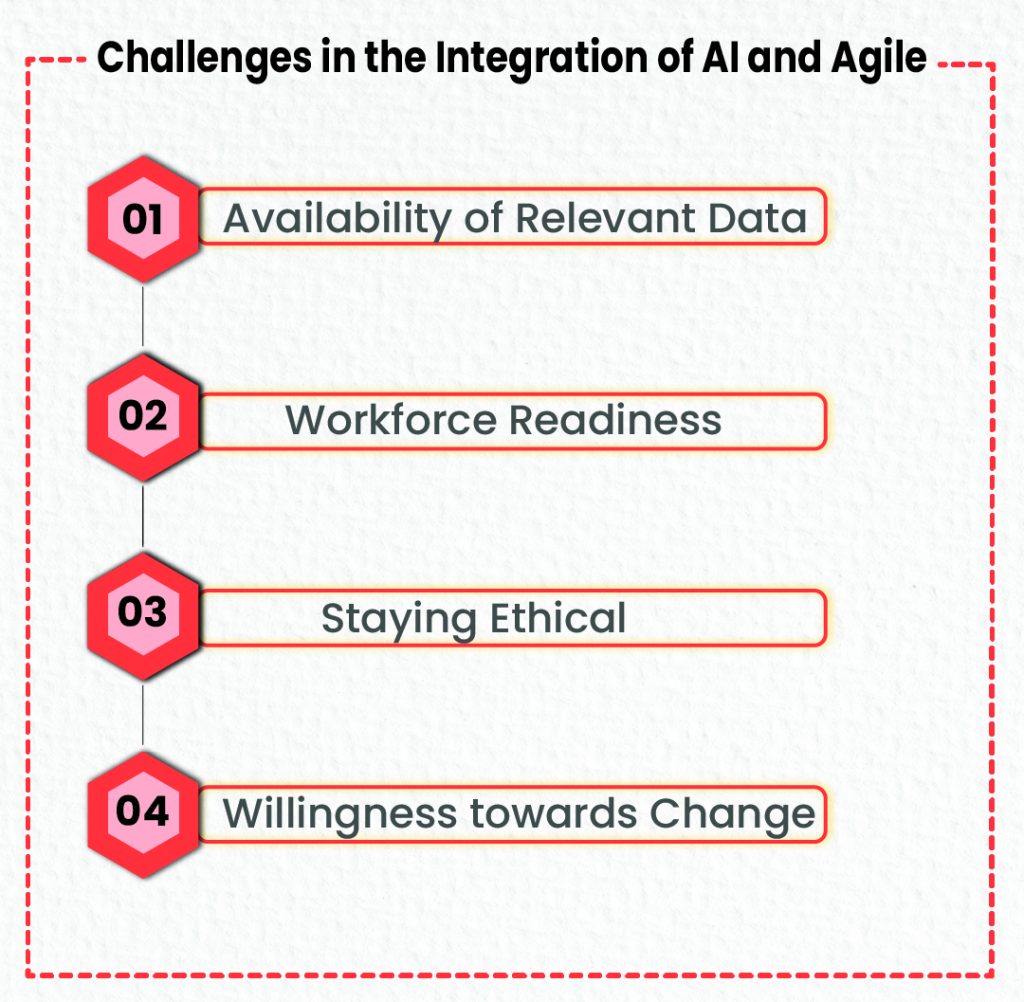Introduction
In today’s dynamic world of Product Development, Product Managers play a foundational role in leading the team to success. As the market and the industries are constantly changing, Product Managers face complex challenges. With changing customer demands, evolving industry trends, and increasing competition, managers need to excel at strategic thinking, decision-making, and identification of customer needs. Artificial Intelligence (AI) can revolutionize the way teams operate, and empower them to succeed. In this article, we dive deep into the impact of AI advancements on Agile Product Management and how it can be a game-changer for managers.
Can AI be used in Agile Product Management?
Over the last few decades, Agile has slowly yet steadily conquered the product management industry and proven its mettle. Agile’s iterative and collaborative approach has delivered increased success rate and customer satisfaction. In recent times, the rapid advancements in AI have shown promising results. Along with several other industries, AI has demonstrated promising returns in Agile Product Management.
In order to understand how AI can impact product managers, it is crucial to understand the AI advancements that are taking over the world. From predictive tools to natural language processing (NLP), AI technologies are transforming the way management lifecycle works. The AI tools such as machine learning frameworks and automation tools have also gained attention for their prospective outcomes.
Key AI Advancements Impacting Agile Product Management
The ultimate focus of Agile methodologies is to ensure continuous development and improvement through every iteration. This requires adaptable and agile decision-making backed by data and analysis. AI steps in with its predictive tools and automation technologies to support the Product Managers in staying agile throughout their Agile implementation journey.
AI advancements provide predictive reports based on past data, and identify market trends and industry dynamics, thus empowering the managers to make informed decisions. As Agile advocates customer-centricity, it is crucial to keep up with the changing customer requirements. Artificial intelligence processes and analyzes large volumes of data and identifies the market trends to achieve customer satisfaction.
AI can improve several workflow operations and management tasks with its tools and technologies. Here are a few ways in which AI can impact Agile Product Management.
Market Research and Trend Analysis
To stay ahead of the competition and sustain in the long run, organizations need to identify the market trends. AI tools enable the managers to perform predictive analysis utilizing the historical data. Artificial Intelligence supports Product Managers to predict future trends by going through vast amounts of data. The organizational sources for the predictive analysis could include customer feedback, user behavior, and customer preferences.
While market research and trend analysis are humanly possible, AI assists in saving time by going through large volumes of data and consolidating it in comparatively less time.
User Experience and Customer Satisfaction
Another one of the AI advancements that utilizes customer behavior data to improve customer satisfaction is Natural Language Processing (NLP). NLP leverages unstructured data like user reviews, feedback, and support tickets to summarize user behavior. This data is useful to gain a better understanding of the needs and expectations of customers.
AI tools are also efficient in segmenting customers based on their demographics, requirements, and behavior. This segmentation is then used to suggest products and services accordingly. These AI tools enable A/B testing and contextual marketing, thus achieving customer satisfaction.
Forecasting and Decision-Making
For a Product Manager to make the right decisions at the right time, and be able to justify them to the team, he needs to be backed by relevant data and its analytics. Machine learning frameworks are one of the AI advancements that analyze comparably large volumes of datasets and identify relevant patterns. This analysis by the artificial intelligence technologies can be used by the managers to make informed decisions aligned with the vision and mission of the project and company.
The data analyzed by AI empowers the Product Managers to make data-driven decisions and allocate resources in an informed manner. This in turn boosts customer-centricity and the overall efficiency of the project.
Workflow Automation and Bug Detection
The organizations these days are transforming the workflow processes to match the industry standards and customer demands. Various operations that are repetitive and manually performed take up valuable time and energy, reducing the efficiency of the workforce.
AI Automation tools step in to automate such repetitive processes and reduce manual labor. These AI tools allow the Product Managers to utilize the workforce and resources for more important and relevant tasks. Along with automation, AI tools and algorithms are also capable of identifying bugs, thus saving the cost and time of damage repair in the later stages.
Content Generation and Improvisation
In the digital landscape, creating content for multiple media in various forms is the need of the hour. Artificial Intelligence has been gaining traction for its multimodal tools which enable the users to generate various forms of content.
From textual content to generating audio from text, images, and other forms of content, AI can do it all. These tools can reduce the workload for the teams, overall enhancing the results of Product Management.
Challenges in the Integration of AI and Agile
While the integration of artificial intelligence in Agile is a boon, it comes with its set of challenges. Below are a few challenges a Product Manager might face in the process of AI adoption by Agile teams.
Availability of Relevant Data
For the AI tools to derive the trends, patterns, and segments, it is crucial for relevant data to be available. The metrics and analysis will be unreliable with insufficient data.
Workforce Readiness
As much as artificial intelligence is gaining popularity, it cannot however function without human intervention. Hence the workforce needs to be appropriately trained and upskilled to be able to instruct AI and work along with it. Lack of proper training can lead to a disaster instead of success.
Staying Ethical
Like every other new technology, AI comes with its own controversies, and staying within ethical compliance is one of them. How and how much AI is being used is an important factor in deciding whether the use of AI in a particular task is ethical. The policies and guidelines to avoid the misuse of AI is important.
Willingness towards Change
All being said, despite the benefits, organizations and teams are more often than not, unwilling to welcome changes. From their job descriptions to job environments, a lot might change for various employees with the intervention of AI. A Product Manager’s biggest challenge would be to bring his team on board to work in collaboration with AI.
Conclusion
AI advancements have been taking over the world, and Agile Product Management isn’t an exception in this advent. Agile teams can in fact increase their success multifold with the right utilization of AI. By maintaining ethical standards and overcoming the challenges in AI adoption, Product Managers can improve their team efficiency exponentially and take their organizations to the next level.
If you haven’t already completed your Agile Product Management Certification, explore our SAFe® Product Owner/Product Manager (POPM) 6.0 Certification and Training and SAFe® Agile Product Management Training with Agile Product Manager (APM) 6.0 Certification.
























